So here's yet another game plan that assembled itself in my head and had to be tried out.
The second Korea game reinforced a common thread running through all my games, which is the rewards bestowed by city-states. The games that most satisfyingly exceed my expectations are when I get a lot from them, as in the Greece and first Poland Jesuit games. Conversely, the least satisfying games are the ones that turn out thin in that department, as with the tiny map Aztecs and Babylon Jesuits. In both of the latter, the lack of maritime food left me growing less than I wanted, and few cultured CS left me slow and behind on policies all game. The Aztec game in particular validated my preference for huge maps with a lot more city-states to help out. And that Korea game split the difference, finding a small number of allies of each type, enough to function but not to excel.
Of course the big powerup for city-states is the Patronage social policy tree. In particular Consulates scales on huge maps, where +20 to each resting point across 24 city-states comes to a total of 480 influence - something like 5000 gold worth! Consulates plus protection is 25 resting influence, from which just one quest or worker retrieval amounts to 70-75 total and a significant duration of alliance. The Patronage opener also scales, with the slower decay also virtually worth several hundred influence over time.
I actually played this concept first in a game with the Shoshone but didn't write up a report. For anyone but Poland, going for Consulates and Jesuit Education would mean skipping both Liberty and Tradition entirely. The Shoshone seemed like the one civ that might handle that. Population from ruins to work hills for starvation settlers might cover up the lack of Collective Rule. Great Expanse means we don't need monuments or the Liberty opener, and if the land grab gets an extra hammer resource, that's like Republic. And the Pathfinders are great at clearing camps for the city-states. The game worked out about as I expected, solid but showed that city-states couldn't quite out-snowball Liberty's frontloading, and came to an unexceptional finish date so I passed on writing the report. It did have a beautiful Petra capital though.
Enter Poland. Of course they and they alone can afford all of Liberty, Consulates, and Jesuit Education. Citizenship in particular really is important. I scoffed at it a long time ago, saying just build another few workers instead and you're as well off. But the thing is, no, you can't just do that. Building workers sets back everything else. Granaries and monuments and everything else are also urgent and you really can't fit in building workers too. Also I was used to the pre-BNW mechanics where gold to buy workers was much easier to obtain from both rivers and AIs, but that's no longer true. And Citizenship does combo into Patronage to connect roads for money to buy city-states.
| Policy number |
1 | 2 | 3 | 4 | Classical freebie |
5 | 6 | Medieval freebie |
7 | Oracle | 8 | Renaissance freebie |
9 | 10 | 11 ... |
|---|---|---|---|---|---|---|---|---|---|---|---|---|---|---|---|
| Tree | Liberty | Patronage | Piety | Rationalism ... | |||||||||||
The timeline works perfectly: 4 policies in Liberty up to Citizenship, then the 5th and the classical era freebie into Patronage, then the 6th, 7th, medieval freebie, and Oracle into Piety up to Reformation just at the right time. Then Mandate of Heaven as the 8th as usual. The one thing missing will be Meritocracy, but the plan is to compensate with mercantile city-states and then the Forbidden Palace.
Here's another angle. Compared to the standard plan of Collective Rule then Jesuit Education, Poland's freebies will add Citizenship, Patronage, and Consulates. If a civ's UA read "free worker, +25% faster workers, -25% influence decay, +20 influence resting point", it would be pretty good, right? Poland does that AND THEN FOUR MORE THINGS TOO.
(Poland essentially gets three freebies pre-Renaissance, not just two for the classical and medieval eras, because they can use the Oracle early rather than needing to delay it into Rationalism like other civs.)
I had talked before about trying to stuff Poland's extra freebies into Patronage with unsatisfying results. That was because Consulates didn't come early enough, after completing all of Tradition. Consulates takes 20 turns to actually ramp up to the new resting point. It makes a big difference to get Consulates at the 5th (plus freebie) policy on turn 70 to ramp up by 90, compared to the 8th around t120 when the game will be almost over by the time it maxes on 140.
More investment into Patronage isn't worthwhile, or even possible. The only available policy is Philanthropy (+25% to purchased influence), which is small potatoes compared to Consulates. Consulates is hundreds of influence across all the city-states; Philanthropy might be activated five times for ten influence each over the whole game. That's just inferior to Theocracy for money to simply buy more influence that way. The next policy beyond Philanthropy, Scholasticism for a bit of science, would be nice, but there aren't enough policies to reach that and still get through Rationalism on schedule. So Patronage will stay at just the two policies.
The one thing Poland doesn't have is a UU to clear camps. We can only do the standard stuff for that, hope for some scout->archer ruins upgrades, and build a couple of chariot archers as soon as we can.
This plan brings me to describe an additional step that happens in my setup process but I haven't detailed before. The roster of city-states gets determined upon starting from the game-setup screen; the list stays the same when you "restart game" to reroll a map while already in game. For most of the playthroughs I report here, I take advantage of this. If I play a partial start then discard it, I know what city-states are present. I can restart with that same roster if I like it, or generate a new list from the game-setup screen. (That's what went wrong for Korea. The first start went well enough to play out so I never discarded any, so never had the chance to reroll away from the list that included only three maritimes.)
To set up this game, I took a shortcut, and discovered that you can simply open the save file in a text editor and read the roster of city-states that way. This isn't exactly cheating; the same knowledge is possible if you simply explore in-game to find all the city-states.
Maritimes are obviously the most desirable type. Mercantiles are actually second-best. Despite how I try to avoid relying on mercantiles, they do stack better in quantity than any other type after maritimes. Cultured city-states are helpful but not essential before the industrial age. Religious are marginal as a drop in the bucket next to Desert Folklore, and militaristics are wholly unnecessary. Mercantiles may be the category to gain the most from the Consulates approach: one quest still gives an alliance of only a few (10-20) turns, but does give a long friendship, and the mercantile type has the most proportion of its value in the friendship tier.
Here's some math. There are 58 city-states defined in the game data, 14 each of maritime, mercantile, and cultured. The combinatorial comes to a 32% chance to pick at least 7 maritimes in 24 slots, then a 23% chance to pick at least 7 mercantiles in 17 remaining slots. Those seemed like good thresholds to aim for, a combined 7% likelihood is within reasonable possibility with some rerolling. The unreported Shoshone game turned up a nice mix on just the second roll of 7 maritime, 7 mercantile, 5 cultured.
I rerolled for about an hour for Poland and never saw something good at those same thresholds. But then a miracle turned up of six mercantiles, five cultured, and NINE maritimes! That last is just 4.6% likely and the other two categories were also above expected value, making this truly a top 1% percentile result. I went with it even if I really wanted one more mercantile. (And realized that no matter how many I get, I'll still want one more.)
To recap the game settings for new or infrequent readers: Prince difficulty, Inland Sea map, huge size, hot climate, young world age, following Civfanatics Hall of Fame eligibility rules which means the standard counts of opponents (11) and city-states (24) and no wacky options like always peace or policy saving. (Disable Start Bias is okay.)

I have no idea what that one grassland hill thinks it's doing in the middle of all the desert, but this is replete with all the ingredients. 3-food tiles in first and second ring, marble, sheep, mountain, plenty of Petra hills.

Ruins gave a perfect start: the first one gave culture on turn 2, and the second just one turn later yielded population. These were followed by t6 Archery, barbs, then:
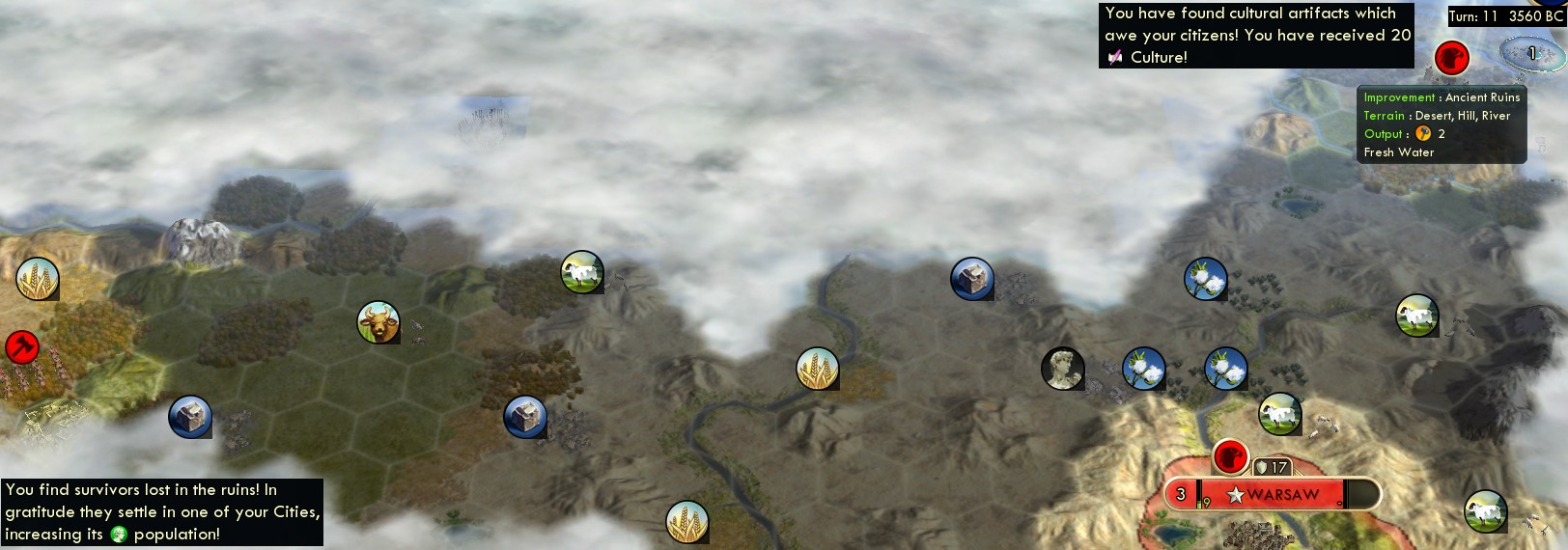
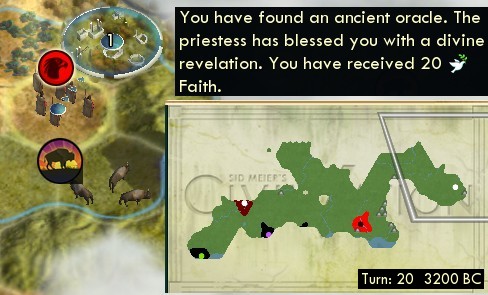 on turn 11 the twin jackpots of culture and population again.
on turn 11 the twin jackpots of culture and population again.
Then barbarians, then the faith ruin perfectly on its turn 20 schedule to get Desert Folklore for the pantheon.
More followed for a big aggregate haul. Turn 21 finally some gold (but the minimum value of 50), t24 Bronze Working!, archer upgrade nice, map, t32 big faith towards the prophet, t37 one more population, barbs, t46 a very convenient The Wheel, t49 late culture still helps, t50 a very belated but very helpful spearman upgrade, t55 yet one more culture ruin.
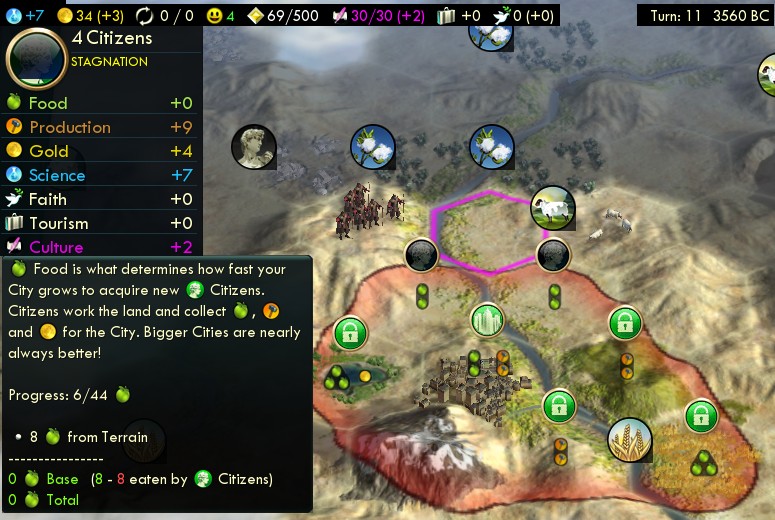
A significant decision here. Warsaw grew to size 2 from a ruin, 3 from normal food, and 4 from a second ruin. Do I stagnate now in the displayed configuration to build scouts and everything faster, or keep going for one more regular growth? I picked growth and I think it was correct. Because I would buy the sheep tile soon. Working sheep would mean some food would go to waste in the stagnation configuration: either that 1 surplus sits in the food box without going to use until after the starvation-settlers phase, or is inefficiently burned by swapping off a 3-food tile to a 2-hammer tile. In other words, this is yet another instance of the principle I keep mentioning, that a cost of 44 food to grow really means less than 44 hammers when there is a choice involved between a 3-food or 2-hammer tile. The opportunity cost in hammers would be somewhere less than 40, which would be made up within 13 turns of one extra population working one extra hammer tile for starvation settlers.
Thanks to the two early culture ruins, I got my policies about as fast as they can come: turn 6 Liberty opener, turn 11 Republic, turn 30 Collective Rule. Enacting Republic that early does make a difference in getting scouts going.
Build order: 3 scouts to explore - monument - scout to go steal a worker - worker - archer - starvation settlers.
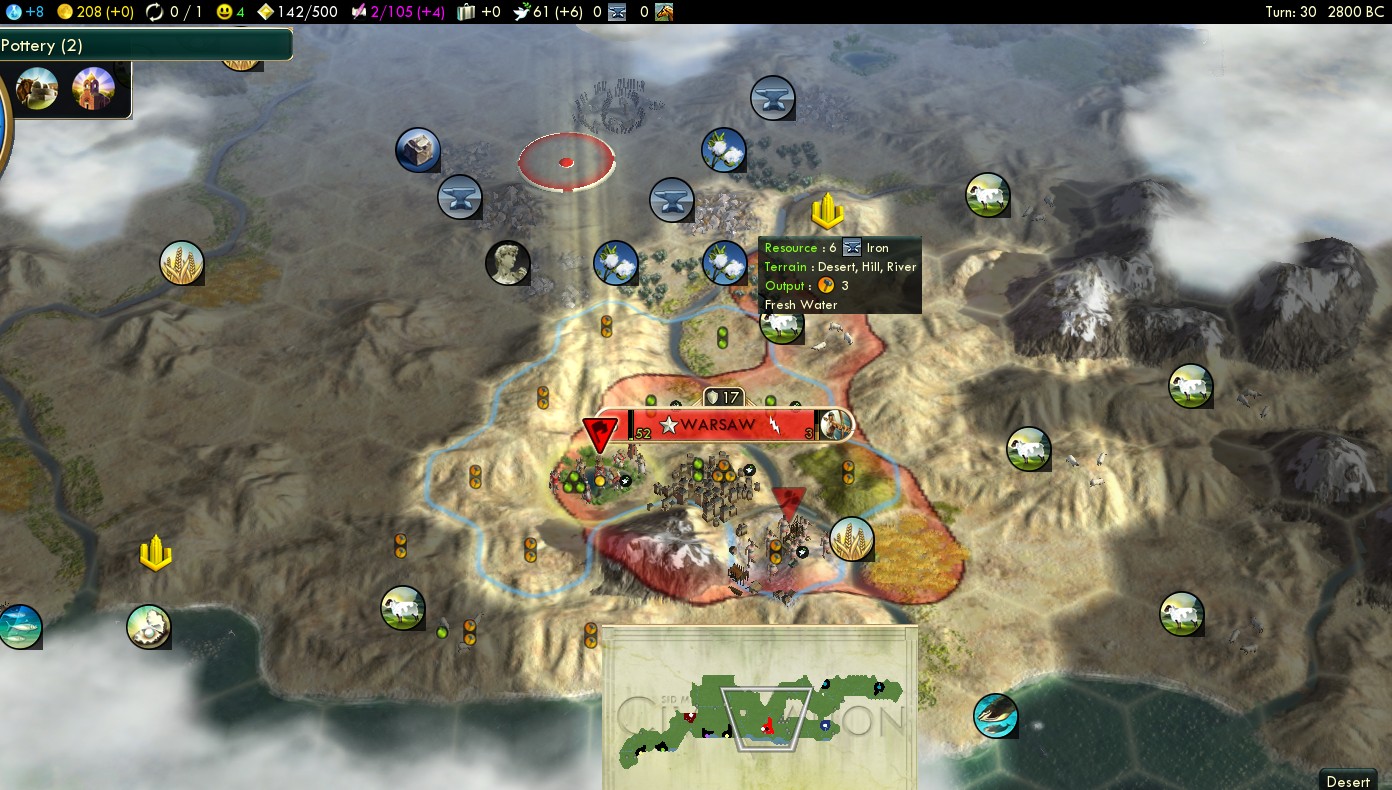
Here's the CR free settler looking around my neighborhood. Nice expanse of desert, luxuries in the water, plus two more (sugar and silver) to discover soon off in the northwest.
That pop of Bronze Working from a ruin had been hugely significant. It revealed eighteen units of iron on three tiles north of my capital! That iron hill in the middle would be a perfect city site, able to knock out the Pyramids in record speed with a 4-hammer city tile plus the second iron hill.
But... I couldn't get the settler there. Notice the barb camp two tiles away from that iron hill. I'd lose the settler if moved there unescorted, and an escort is still three turns away from being built. I really didn't want to wait three turns. And also, besides the barb camp itself, notice the red circle -- I am right-click-dragging with the settler active, which will red out the cursor if there is a unit on the hovered space. There is a barbarian unit there too, which could cause problems in getting to my desired site even with an escort on hand. Alternatively, I might manage to get the settler to the spot that the game is suggesting, but that's considerably less exciting than the iron hill, and the second barbarian might block that too.

Not a wonderful solution, but I moved the settler here instead, because this spot was known to be presently clear of barbarians. I have come to like coastal cities just for the factor of being sheltered against barbs from one direction. And I went with the Pyramids here anyway. I hated to tie up a coastal city which should be building work boats and cargo ships, but decided I couldn't take any risk of losing the Pyramids by delaying it to the iron city which was still another eight turns away from founding. Krakow does pull my favorite trick, that the cities can help each other with tiles: Krakow claims a desert hill within the capital's reach for settlers, and can itself reach the capital's food tile (oasis) which it won't use during starvation settlers.
Krakow isn't on the river. Shortsighted? No. This is OK and calculatedly so. A river has three properties in Civ 5: allows a watermill, a hydro plant, and a garden. The watermill is not necessary for a coastal city that will be bloated on cargo ship food. The hydro plant is also unnecessary; only the capital needs one in a game that will go Freedom to buy spaceship parts and won't need to build them or factories. And the garden is skippable for one and exactly one city. With this trick: Krakow will be the first city to spawn a Great Scientist right at 100 GPP before any city does any garden. This is possible because Krakow will be first in the turn order, when all the cities that buy a Jesuit university in lockstep will all reach 100 GPP simultaneously. (The capital doesn't participate in this; in fact it gets its Jesuit university last, because pulling citizens off Petra hill tiles is a bigger opportunity cost, and it will have the Oracle to make up some scientist GPP.)

Krakow then received this miracle: just after it grew, a population ruin sent it to size 3! I had to buy the sheep tile immediately or else the city would starve, but that was wonderfully fine. That lucky break knocked a good 10 turns off the Pyramids!
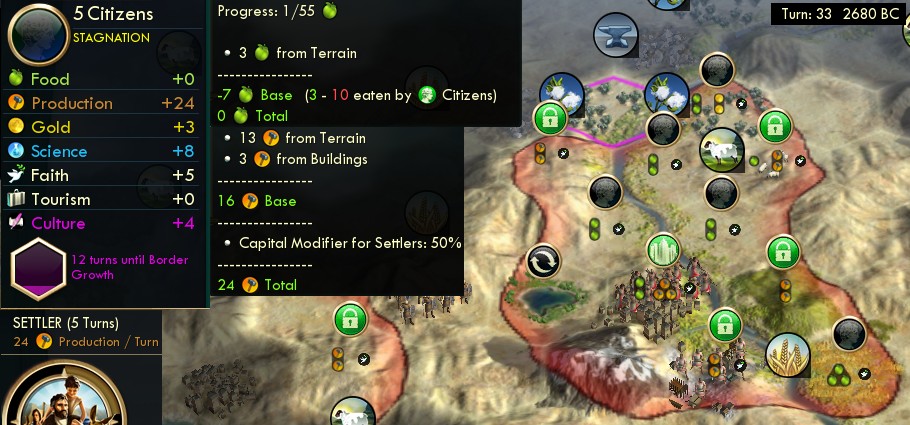
Meanwhile, elsewhere I was following some standard threads. (The report reads better if I consolidate events relating to one subject, but in reality while playing the game all these threads are going on at the same time.) Here's a look at the capital set up for starvation settlers, routine by now though I still like to show it.
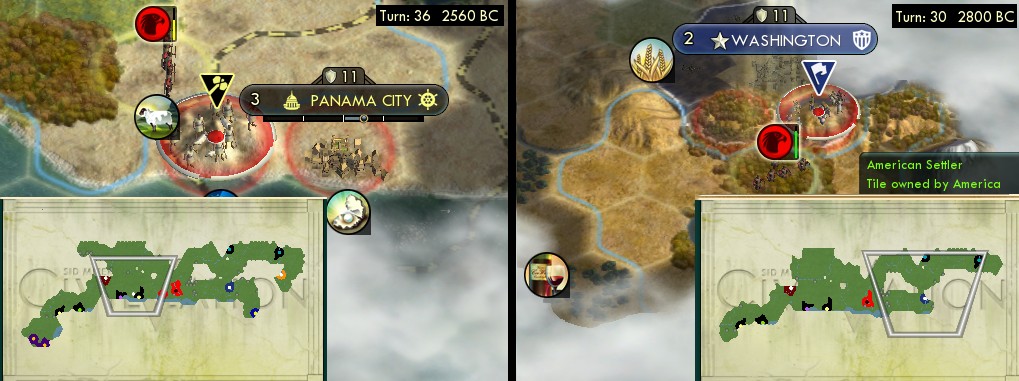
I got worker steals nicely early and conveniently close to home from both a city-state and America. I learned from the Korea game and just snagged the settler immediately rather than trying to wait until it was out of the city's shooting range.

Another trick I've picked up: When a settler doesn't quite complete, put the overflow onto a military unit, usually an archer. This way you sneak most of the +50% Collective Rule bonus onto the military unit as well. It feels bad to delay the settlers this way, but truthfully I've found that you really do need to slip in a couple escort units in between some of the settlers. If you don't, the settlers end up delayed anyway having to work around barbarians to get where they're going. I used to build these escort units out of city #2, but that doesn't work if that city is busy on the Pyramids, and doesn't work from city #3 either because that comes significantly later by 7-10 turns.
One standard action that never happened this time was buying a worker. I never did. I didn't have much money, after only one gold ruin, no city-state tributes, and no gold-producing luxuries at home (cotton doesn't count, you don't want to work just a 2-food tile.) And buying tiles consumed all the money I did have: sheep and then another hill for starvation settlers, marble, whales, sheep at Krakow, and the second iron hill at Lodz. But between the two stolen workers and Citizenship and the fast Pyramids, I could get by with no bought workers.
Research went Mining first as always, Masonry second because marble and Pyramids, Animal Husbandry to find horses for chariot archers (but there were none), then Pottery to get up to Calendar and Sailing for the luxuries. I wanted to go Wheel - Mathematics in time for Patronage (classical era unlock) to be the 4th social policy then Consulates right away as the classical freebie, but that didn't work, research to Calendar and Sailing took too long. Probably for the best anyway, Citizenship is fine in the 4th policy slot, came on turn 49. I did get a nice lucky pop of The Wheel from a fairly late ruin anyway.
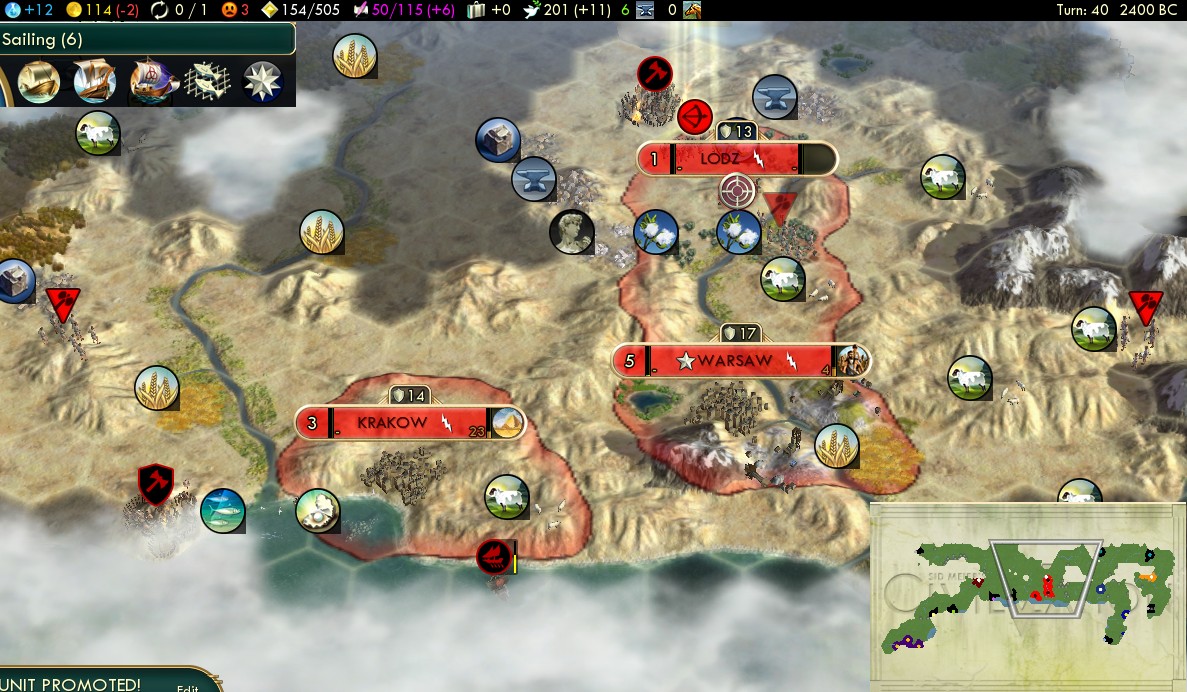
And here's those threads weaving together. The first starvation settler founded the iron hill city, with no delays thanks to that first escort archer. I immediately sold all the iron for 2gpt each, of course. My two stolen workers are approaching the homeland from each side.
And the faith counter is at 200 there. I definitely know this is the right path: settle this prophet as a holy site, don't found the religion yet, because once you do then the upcoming cities don't get the Desert Folklore pantheon for free. Rather, keep settling cities now and found the religion with the second prophet. This method ramps up much faster on pagodas with Desert Folklore active everywhere right away rather than waiting for conversion pressure.
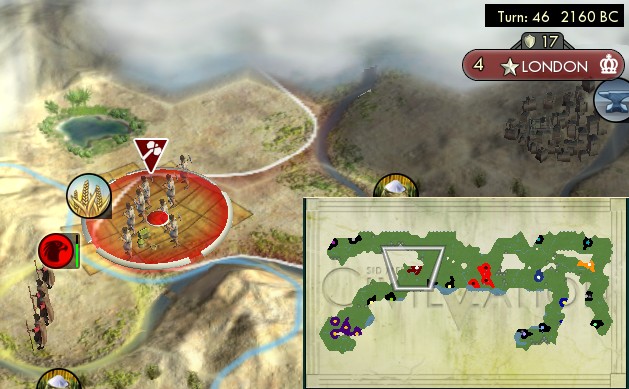
Another worker steal opportunity -- but I actually passed it up, because England was paying me 6/turn for three of my iron!
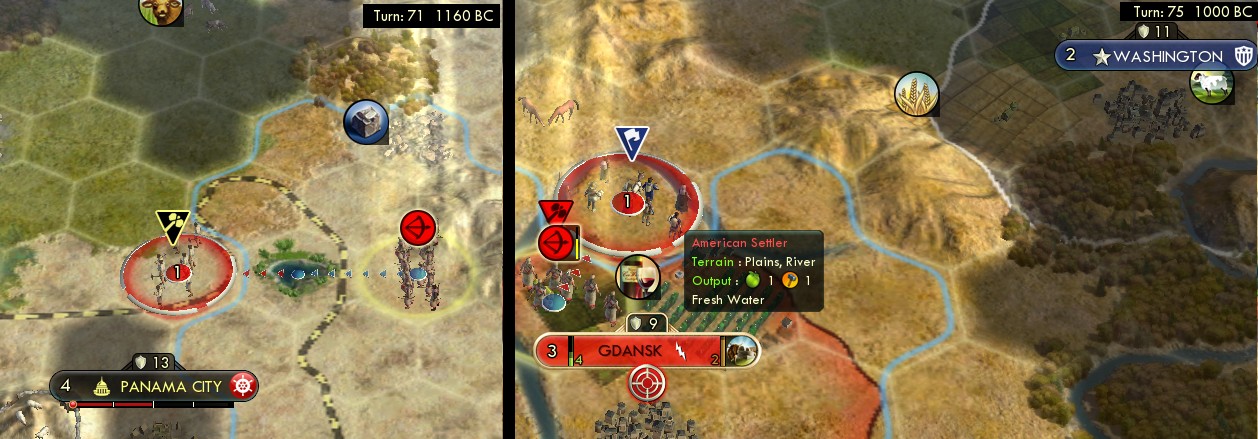
Two more worker steals a bit later. As a usual smart play, I had stayed at war with Panama City after stealing its first worker until a second appeared as well. (City-states penalize you for declaring war a second time, but not for keeping one war active.) And I was still at war with America too after stealing their first settler -- and what in the world are you doing there George, walking another settler right into me!
The Pyramids completed in what I think is record speed for a non-capital, turn 62. A subtle efficiency: I took care to walk workers out to newly-founded city sites before the Pyramids were completed, because a worker misses out on less labor value per turn of travel before the Pyramids as compared to after.

Next standard thread, start clearing barbarian camps. The one for Byblos unfortunately didn't include a recaptured worker, but I decided to pay the 250 anyway (had exactly 251 after the 25 from the camp) to upgrade the maritime to alliance for a good while. As for Buenos Aires, it wasn't maritime, but the culture would still help -- although the plan is to use Patronage to get cultured city-states, not to use cultured city-states to get to Patronage!  And La Venta was a stroke of luck as the city-state's own archer shot down the defending barbarian just as my scout passed by.
And La Venta was a stroke of luck as the city-state's own archer shot down the defending barbarian just as my scout passed by.
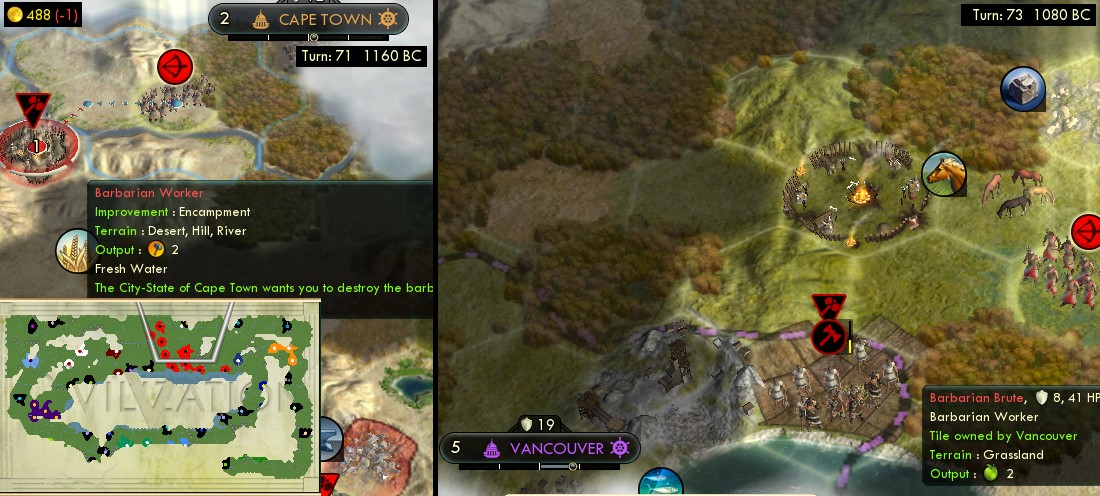
Of course, the important ones are the maritimes. I got my second and third here. Cape Town was an easy camp clear right near home, plus then that worker also got re-recaptured by barbs and I re-returned it an extra time. Vancouver involved some masterful tactical work. First I had intentionally parked there without killing the barbarian brute in the camp in order to let it steal Vancouver's worker. Then I alertly moved my archer one step west, blocking the worker's retreat into the camp, then Vancouver would kill the barb between turns and I could recover the worker without needing to clear the camp. Finally, I smartly continued to leave the camp alone (Vancouver didn't issue a quest for it) to let it keep spawning more barbs to kill for influence.
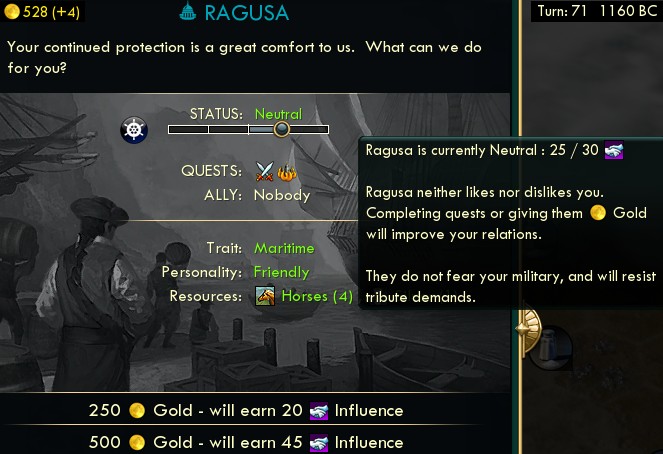
And I decided to buy one directly, making four maritime allies already. Ragusa had had some early quest (natural wonder) so was already at the 25 Consulates influence max. Even coming to only 70 influence total, that would be at least 13 turns of alliance; a conversion of 500 gold : 143 food is a better ratio than buying anything for hammer value. Also some of the food would be multiplied by King Day, plus friendship would continue even if the alliance ran out. And Ragusa was somewhat nearby (northeast corner) with a camp quest I hoped to get to eventually. The money for this had come from two civs (Rome and Byz) friending me and buying my second batch of 6 iron for full cash value of 270 total.
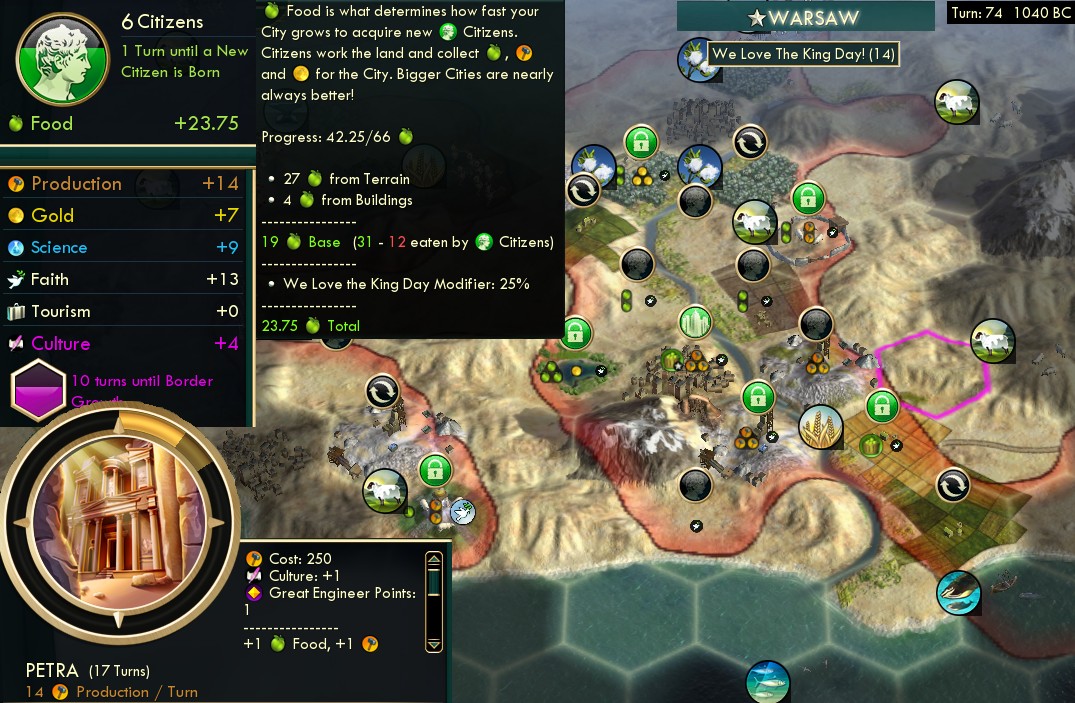
Remember a maritime ally is also 3 food in the capital, not just 1 in every city. All that food and a timely King Day had Warsaw making well over 20 surplus -- BEFORE Petra! And micromanaged to grow exactly accurate to the penny, of course.
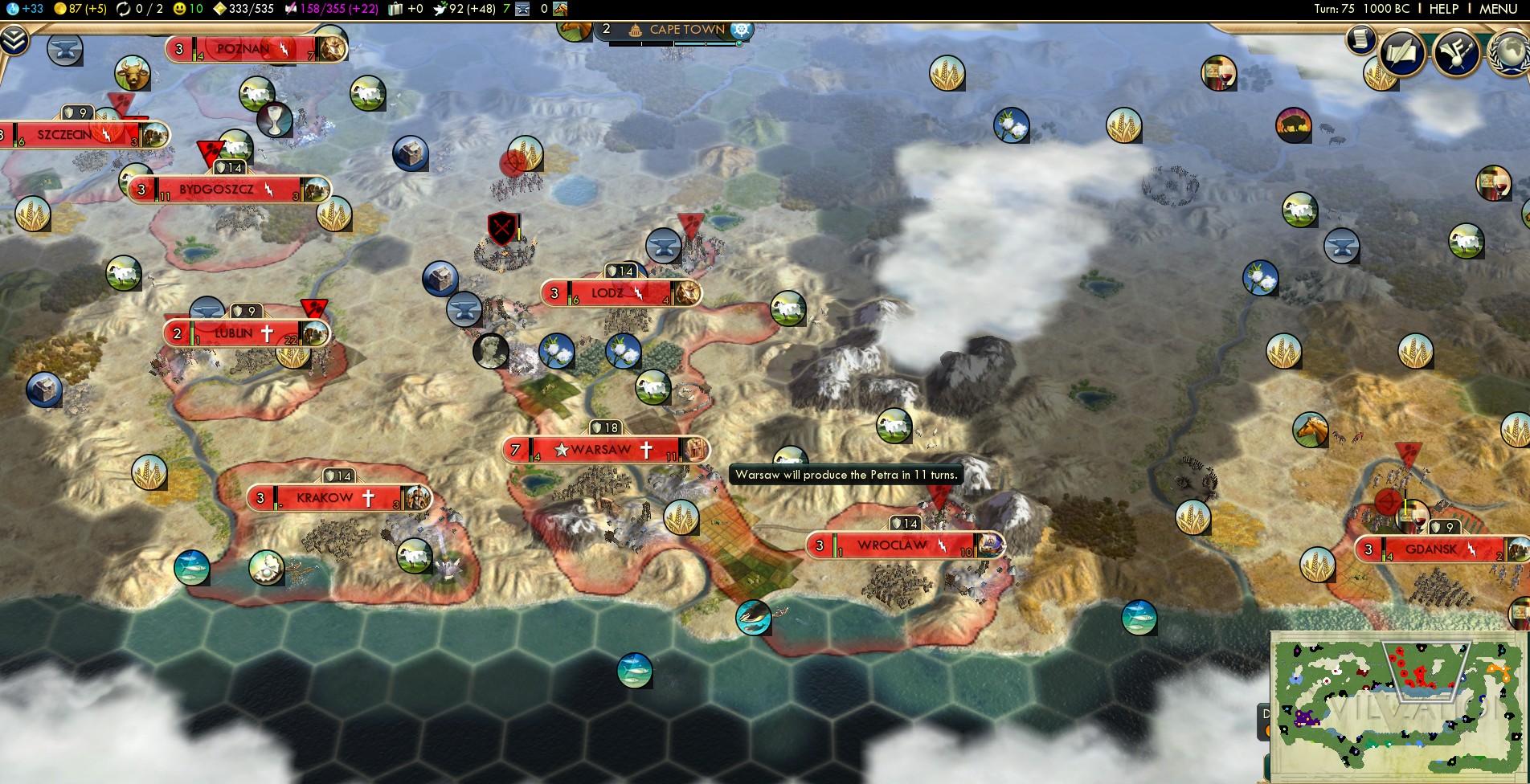
And here is my usual overview at 1000 BC. 30 population is a decent showing but still 8 short of my record in the previous Poland Liberty-Jesuit game. That game used Feed the World while this one has pagodas instead for more happy headroom, and more maritimes on the map.
Warsaw had built settlers out to 9 cities, then switched to get its granary and watermill done before Petra (and also to not waste King Day on settlers.) Krakow is still building one more settler for one more city that would be my 10th. I had a very good supply of luxuries, seven distinct ones total after reaching out for wine at Gdansk and both silver and sugar (offscreen) at Poznan. Also I have three coastal cities for a full complement of sea trade routes, even if the cargo ships always take a while to finish building.
My prophet for the religion had come on turn 66, and founded a couple turns later after all the cities got planted. This picture shows that my first missionary has already converted Krakow and Lublin, which would cascade pressure onto all the rest for conversion, and I could start right in on buying pagodas.
The Patronage opener came on turn 57 with the classical era freebie, then Consulates on turn 68 with the 5th normal policy. That starts the influence ticking up to the new resting point, so by turn 88 that would be at maximum. Micromanagement tip: you can revoke protection while a city-state is between 5 and 20 influence, since it will tick up anyway as long as it's under 20, then you only need the protection again to get it from 20 to 25. Also I realized that Consulates works even with city-states you haven't contacted yet: the influence starts ticking up anyway and you'll have that value when you do meet them.
The one thing that didn't go right around this time was acquiring horses. My first chance at any came on turn 72 by buying from Rome. That was twenty turns later than I'd wanted, to build chariot archers as the best units to go out clearing camps fast. Well, they would still work.
Tech: My eternal question in all of these games is whether to go for Engineering before Education or not. I've convinced myself so many times on both ways being a definitive right answer. Today I'm thinking that the aqueducts are more important than the universities. It's only a small gain for many cities, where it's not that big a difference to get an aqueduct instead of a watermill. But where the aqueduct does make a drastic difference is the capital. It finally struck me that that's what makes the difference in the later game, whether the endgame sees the capital at an anemic size 20 or powerful size 30. It's the aqueduct coming on turn 80 rather than 120 after universities. The aqueduct multiplied by the massive food production from maritime friends and Petra makes for so many extra city sizes in that time, which themselves continue to snowball with more Petra tiles. I always lament how nothing can keep up with all the exponential cost formulas in Civ 5, but the aqueduct is the one effective multiplier that does.
I reached Currency on turn 71, then Engineering on turn 82, tied with the previous Poland game. Philosophy next. Even though I now saw that no AI civ went deep into Piety, meaning there was no risk to lose Jesuit Education so I didn't need to rush to the Oracle. But in fact I did need to start building it ASAP, just to get a head start on unclogging the capital's build queue that would then be full of Chichen Itza and Hagia Sophia and Oracle.

I finally figured out a good answer here for one recurring problem. The capital always does about 8 settlers before Petra, but then I still want to push out one or two more somehow. Problem is there's no good way to do that. I don't want to make the capital waste Petra and stop growing for a settler, but don't want to waste Collective Rule by buying it instead or building it in another city (which also takes a painful 9-11 turns.) But here's the answer. When the capital builds its shrine, use that next turn of big overflow to complete the settler in a single turn. That's how to get a settler with minimal delay. I then sold and rebuilt the shrine to do this a second time as well.

I was still at war with America over here, hoping to luck into more workers or settlers to steal. America finally planted their second city, and also walked a spearman up to me that would cause a headache pillaging the wine. So now I signed peace.
I've learned to expect this weird piece of behavior from the AI regarding concessions. When the AI has only its capital, it won't concede anything for peace. But as soon as it has a second city, it's usually willing to concede that city -- but also becomes willing to hand over all its money. I could have taken New York in the peace deal, but didn't really want it, it'd stretch happiness too far and with only one hill would take forever to build a courthouse or anything else.

Washington's money bought me another city-state. But not a maritime, I picked cultured Kabul. Because the furs were the only remaining unique luxury available from any CS. Also I needed the culture to hurry up to Reformation and Mandate of Heaven.
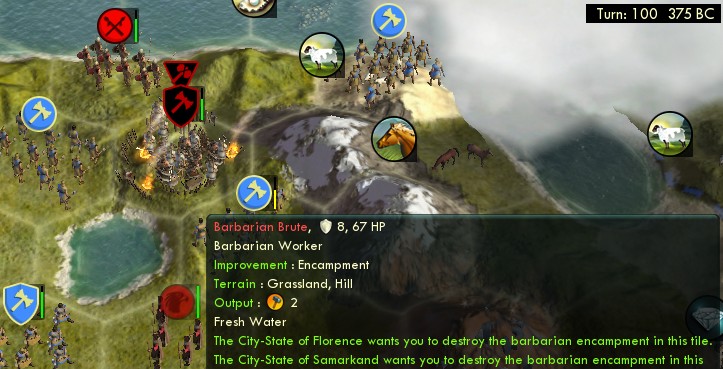
Still looking to clear camps of course, but unfortunately France beat me out to this one. I thought the two French warrior attacks wouldn't quite kill the defending brute this turn, but they did.
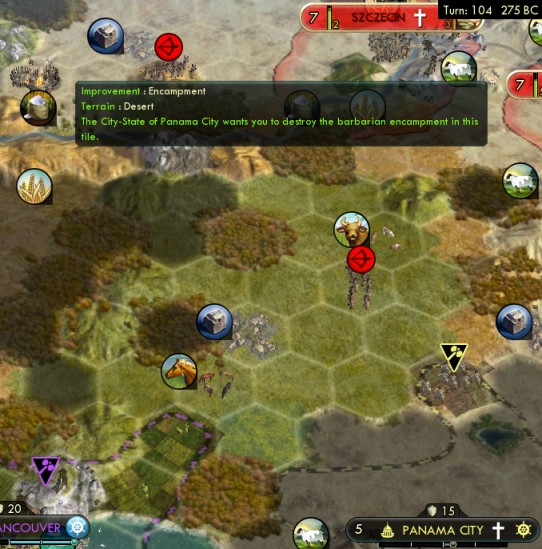
But great luck here. I was already clearing that camp just to get rid of it, but the very turn before I walked in, Panama City suddenly issued a quest for it and I happily acquired my fifth maritime ally.
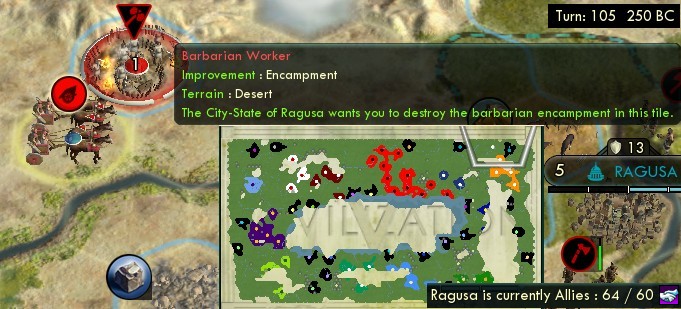
Also finally got a chariot over here to clear Ragusa's camp just before that alliance would run out.
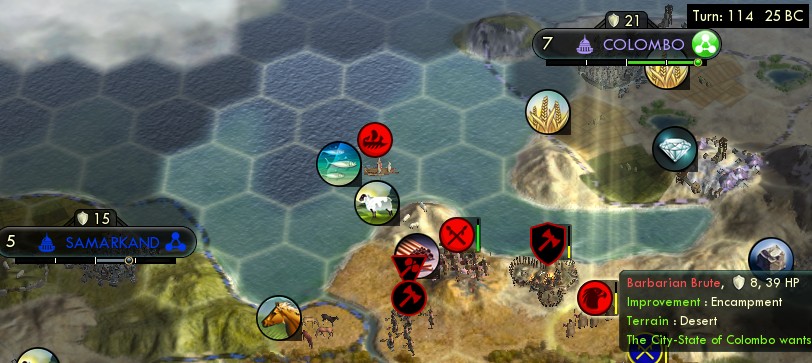
And this one, with notable tactics. I just saw that worker get stolen from Samarkand. I deliberately moved aside to allow it into the camp to make sure I captured it. If I killed the camp first, the worker would run away to some other camp and I might not catch up with it. Also my scout is blocking the Swedish spearman from attacking the camp.
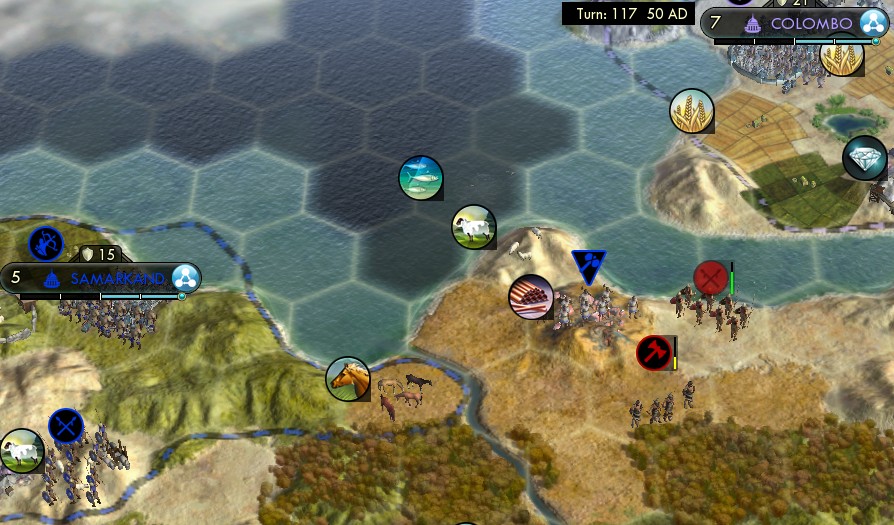
And I got to double-up on returning that worker twice. Look at where it ended up here. No matter how it moves, it's in range for the brute to re-recapture and then I'll get to grab it again.
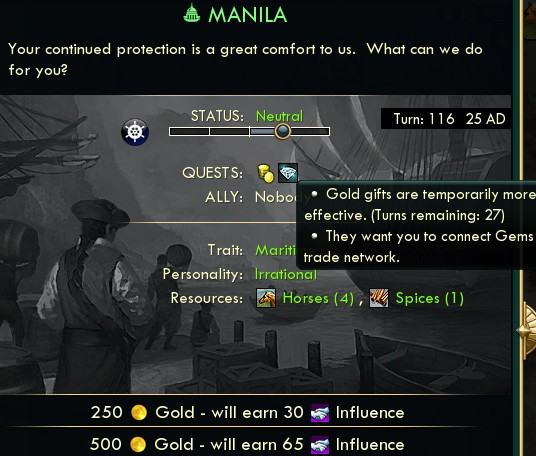
Also acquired another maritime ally (making six) the easy way, when Manila issued an investment quest just as my gold accumulated up to 500. I did have quite a bit of money in the midgame here, got most of the cities connected by road reasonably quickly around turn 100, plus working a lot of cotton and sugar tiles for money and selling a lot of iron to the AIs.

Policies: Turn 84 the Piety opener, t97 Organized Religion, t103 Mandate of Heaven with the medieval freebie, t108 Religious Tolerance, t110 Reformation via the Oracle. I actually screwed this up a little bit. I thought my next regular policy would target Reformation, but oddly that seemed to stretch too far, several turns beyond Education, never had that happen before. Turned out I had miscounted policies somewhere involving Patronage and didn't realize that the Oracle was supposed to claim Reformation. I caught on in time to build it in my capital easily enough, but what happened was that Hagia Sophia got squeezed out -- my usual trick is to build that just before Education so that prophet raises the faith ceiling past 800. Without that, I could only carry about 700 faith into Education, buying only four universities right away rather than the usual five or six.

Religion: Founded on turn 68, spread one missionary as usual, started buying pagodas. Enhanced on turn 100 before completing all the pagodas, because a few outer cities hadn't converted by pressure yet, but I had happy headroom for the moment so didn't need those pagodas just yet, and actually enhancing first would let those pagodas wait until Mandate of Heaven kicked in. For the second follower belief, it was actually a tough call between Religious Center (temple happy) or Religious Community (1% production per follower). I decided I could manage the happy without Center, because yet to come were still Meritocracy, the last few pagodas, some mercantile city-states, then the Forbidden Palace. So I took Religious Community, which given time could make up the happy anyway by building colosseums, and just in general I really like having that one because it makes a noticeable difference on the midgame wonder build queue crunch that the capital always experiences.
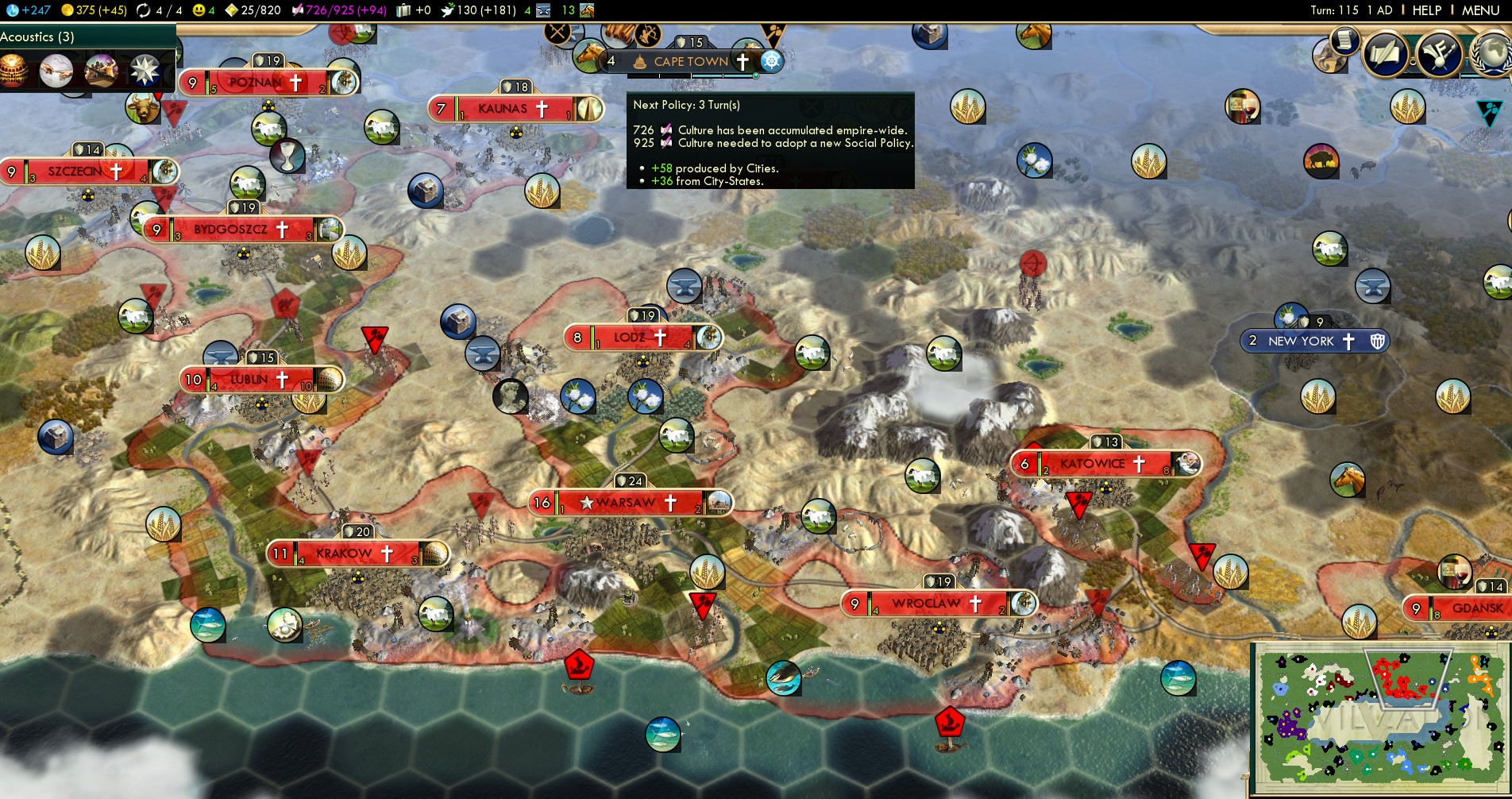
Here we are at the calendar change of 1 AD. Is this game going well? I'm not sure.
The great thing going on is a total of 103 population. That's just one short of my record high (Greece also with big maritime food), and five ahead of the previous Poland fastest finish. Plus three coming at the turn roll. And still some happy headroom; the screen shows 4 but I'm about to clear a camp to get two mercantiles.
But what wasn't so great was the tech pace. Education had come at turn 112, five turns slower than my previous fastest finish. This happened because I was slow to build libraries. The build order for most cities went about like this: granary - aqueduct - shrine - monument - watermill - library - temple - colosseum - garden. All the food buildings were frontloaded there. The big question of this game would be whether the frontloaded push for population (and all the maritimes) could eventually make up for being a bit behind on beakers. The cities were already looking quite solid thanks to the aqueducts coming fairly early (around turn 95) plus Religious Community, so I was hopeful.
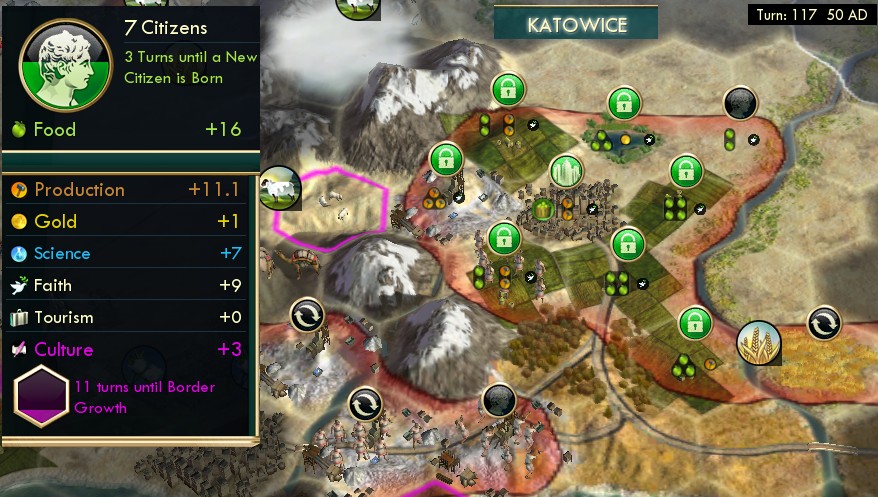
Key to making the population push work is city positioning. I was quite happy with that in this game. Liberty games without Tradition really hurt for border expansions. It's all about the initial ring of six tiles. You want all six to be good workable tiles, with minimum two and ideally three hills. Any less and a city won't get anything built, since the tile picker hates hills. Katowice here is a great example of doing this perfectly. Any other site in this area would miss multiple hills and waste first-ring tiles on bare desert or mountains. But here it's fully surrounded by good tiles and developed very well. It's worth giving up river access to get that right. (The oasis does still allow a garden, though it wouldn't be necessary here as this city came last and all the others would do great scientists instead.)
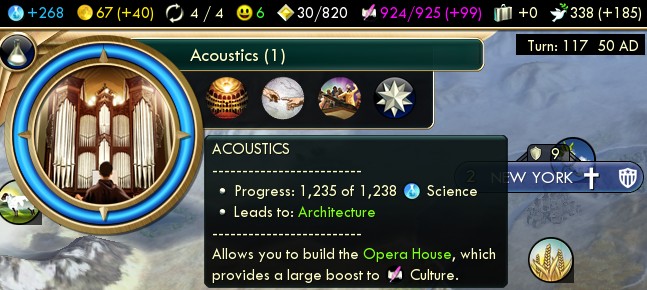
I fell short of Acoustics this turn by 3 beakers and culture by 1 -- intentionally because I wanted to! Because the 320 faith in the bank is just enough for the last two universities before their cost escalates by advancing to the Renaissance.
So turn 118 I proudly took both the Rationalism opener and Secularism by the renaissance-era freebie. The culture pace at least was running a few turns ahead of the previous best game (t122 to Secularism), so again I'm still hopeful. Humanism would follow on turn 129 and Free Thought with the industrial era freebie on t137.
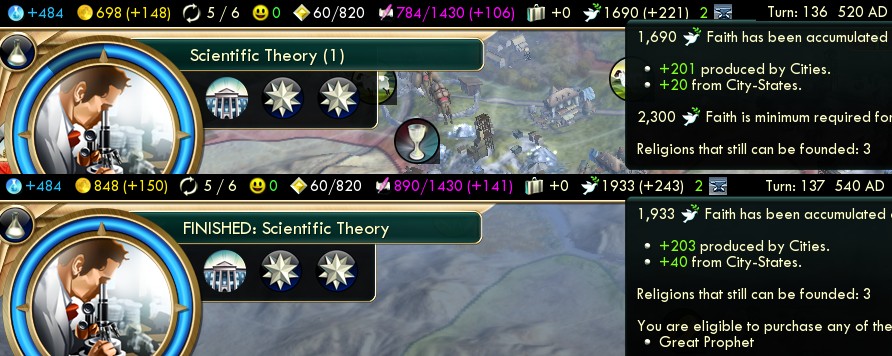
I spent my first scientist bulb on turn 136 to reach Scientific Theory on turn 137. The plan at this point is to bring as much faith as possible past this point to buy schools. After buying the Jesuit universities and the last few pagodas, I spawned and settled prophets at the 800 and 1200 faith levels, then used Hagia Sophia to claim the 1700. That let me bring over 1920 faith into Scientific Theory, enough to buy six schools right away. I never noticed this before, but you get the new era's higher value for cultured and religious city-states on the same turn that you reach that era, which here actually made the difference on buying that sixth school this turn.
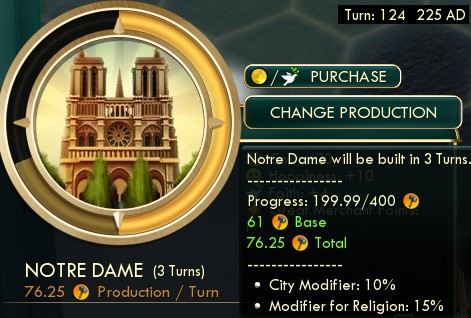
This has nothing to do with anything, but I was highly amused at seeing an item at 199.99. 

This also has little to do with the narrative, but I just recently found this information screen, it's on a secondary tab of the F2 advisor screen. This shows where I'm exporting all 30 units of iron that I own, a minor cool achievement in itself.

 Presently I finally got a chariot archer over here and cleared this camp for Wellington. That was the last remaining unallied maritime and now I had all nine on the map in alliance. That's +9 food in every city, displayed as 11 food from each city tile. Still pushing population as much as I can.
Presently I finally got a chariot archer over here and cleared this camp for Wellington. That was the last remaining unallied maritime and now I had all nine on the map in alliance. That's +9 food in every city, displayed as 11 food from each city tile. Still pushing population as much as I can.
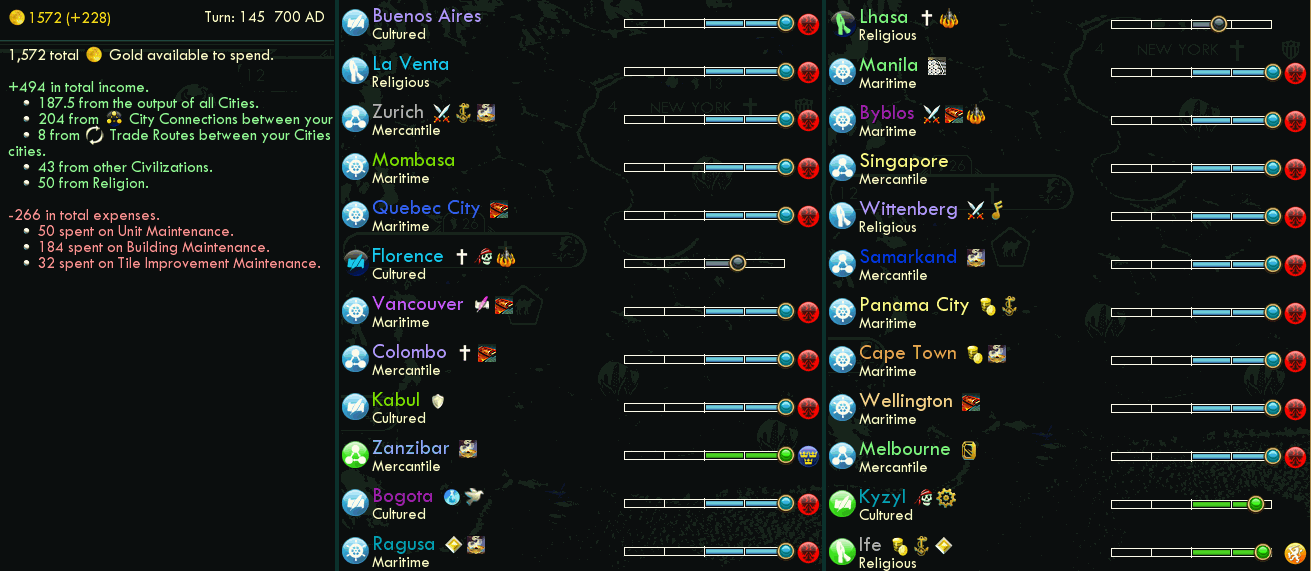
I had a quite a bit of income throughout the midgame, from those resource sales, Machu Picchu completing quickly (mountain at the capital), and the high population with Citizenship workers connecting the roads fairly soon. I also presently figured out to start building trading posts on hills. Once the cities finished the important buildings -- up through garden, colosseum, workshop -- hammers became really not all that important. It was a better use of a hill tile to give up the mine (just +1 hammer) for a trading post instead for +3 gold with Economics and Golden Age and +1 beaker with Free Thought.
I put all that money into buying city-states, as is natural for a Patronage game. I bought my third and fourth cultured allies around this time, on reaching the industrial age when their value goes to its maximum. I also refreshed maritime allies with cash on occasion, usually after one quest had brought them to somewhere between 60-70 influence that then ran down. I bought a mercantile just once, and only for the cheapest price from the resting level up into friendship, on a turn I badly needed the happy. I would then refresh that friendship with a spy election rig.
How were we supporting the happy for all that population? Mercantiles helped, and also I built colosseums surprisingly early, thanks to the well-grown and developed cities and also Religious Community. That said, I did stall out on city growth for about four turns right before the Forbidden Palace completed and also Meritocracy finally came (on turn 141 after the important Rationalism policies.) But I think I played this well enough; a short stall is OK because it means you were pushing hard enough on growth. My earlier assessment that I could get by without the Religious Center belief seemed to turn out correct, with the gap largely filled by Religious Community accelerating hammers enough to build those colosseums.
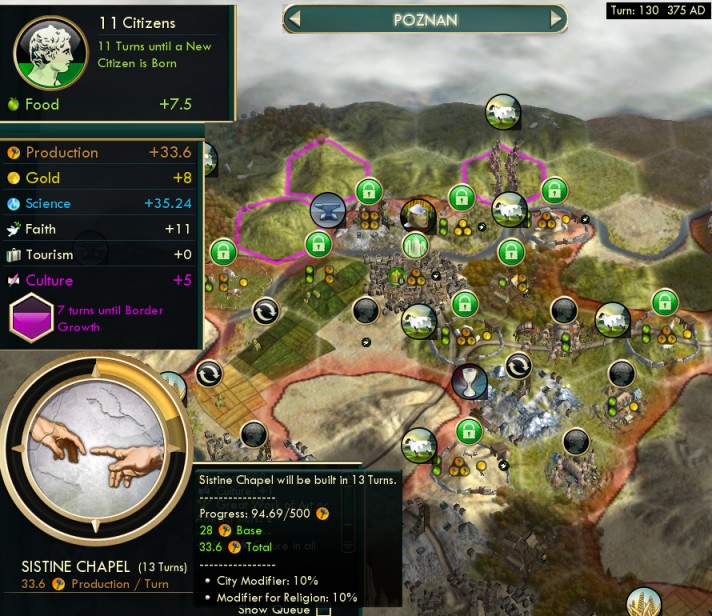
The capital's crunch on building midgame wonders was even worse than usual thanks to needing to fit in both Machu Picchu (capital had my only mountain) and the Forbidden Palace. To alleviate that, I was able to offload the Sistine Chapel to this unexpectedly strong city, powered with a stable boosting five animal tiles! Religious Community also helped. More frontloading and snowballing: the more hammers you have, the sooner you finish the basic buildings and the workshop, and then accelerate the wonder itself. This city would also go on to build Big Ben later.
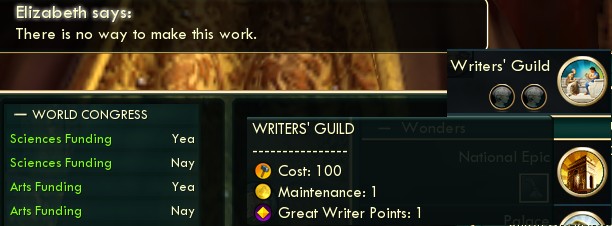
Here's an interesting situation I haven't had to contend with before. The competing World Congress proposal to my Sciences Funding was Arts Funding. Usually I don't need to care about the other proposal -- in fact sometimes if an AI won't take a bribe for Sciences Funding, I'll even pay them to vote on the other proposal instead, just to deflect their vote away from a potential nay on Sciences. But now I need both Sciences Funding to pass and Arts Funding to fail, or I get no benefit.
And I couldn't get a single AI to budge on votes. Every one of them rejected every attempt to buy a vote for Sciences Funding or against Arts Funding. I understand more now why this happens: the AIs prioritize the Drama tech and build the Writers' Guild pretty quickly -- and the building itself provides writer GPP even if they aren't actually running any writer specialists, so the AI always stands to lose from Sciences Funding and gain from Arts Funding.
The only way I could gain any votes was to keep buying city-states. I deliberately bought one that was someone else's ally in order to swing that vote to me instead.

Here comes the vote. The only thing I could do was split my own votes like this and hope that I can carry both resolutions or that some AI might somehow defect...
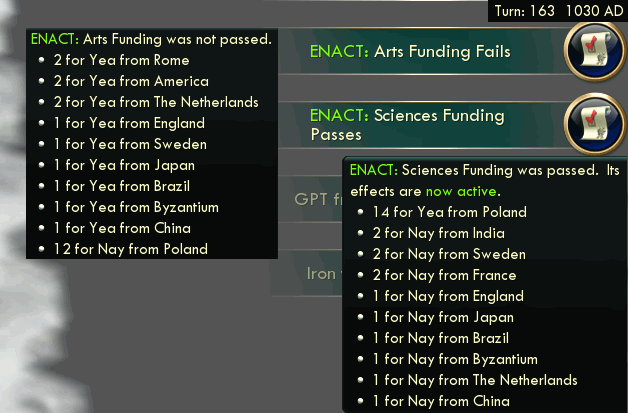
Holy crap, I guessed that perfectly! (I swear I didn't cheat and reload, though omigod that would have been tempting.) I outvoted the entire world by myself. I perfectly deadlocked Arts Funding into a 12-12 tie (which fails), and barely outvoted everybody for Sciences Funding 14-12. Hah, good thing the Patronage game is when this decided to happen!
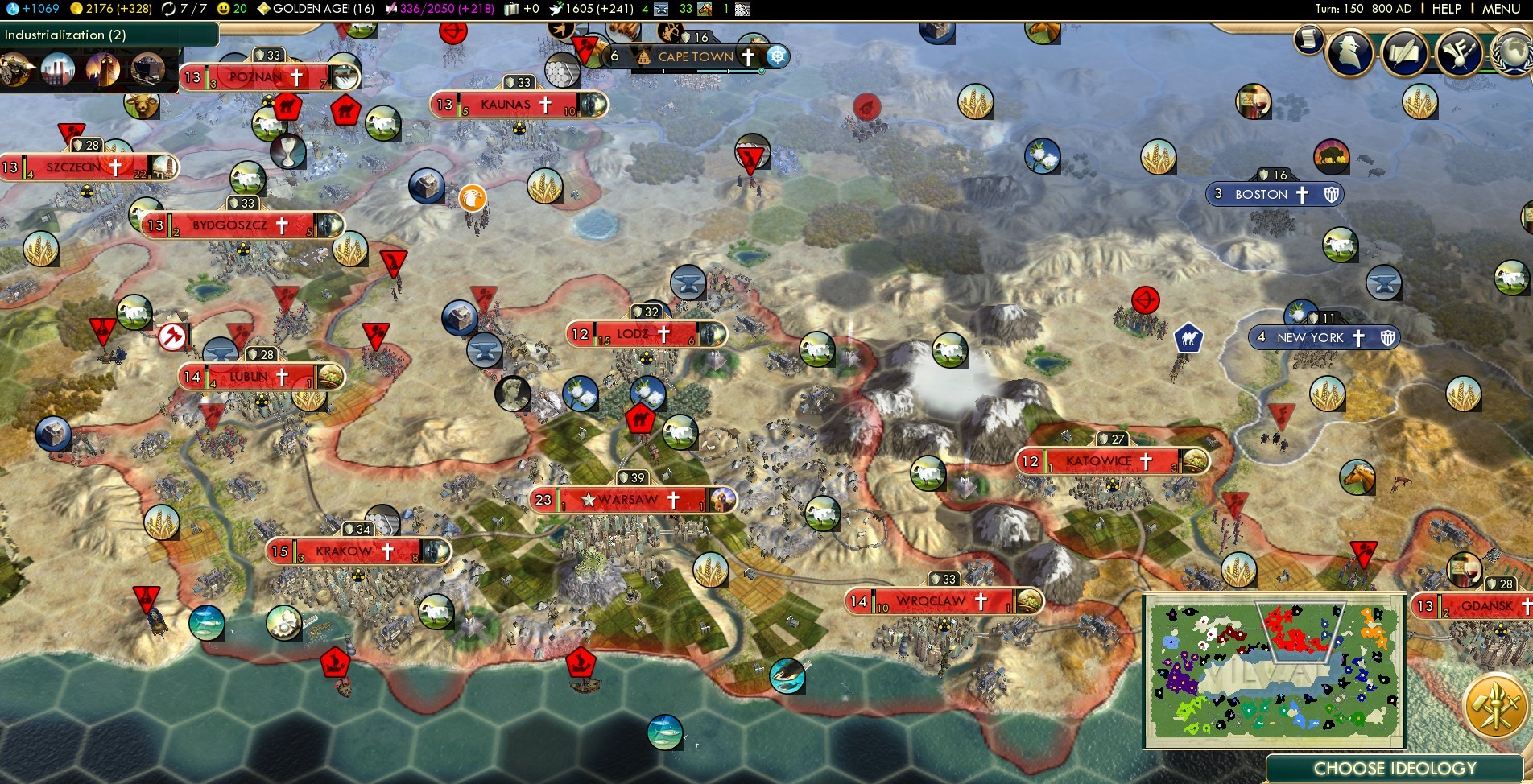
Turn 150 checkpoint. 155 population, 1069 beakers. Virtual tie with my previous best Poland game (158 pop, 1020 beakers.) Slightly behind my Shoshone game but that had three more cities. Overall, this is my best showing yet on tech pace, in terms of beaker production per tech cost, factoring in the per-city penalty.
The ideology arrived presently, which was Freedom. Although I hit lousy timing on policies for once: the previous one just missed getting into the ideology, and Poland's modern age freebie can't go there either (it comes immediately on the modern age but the ideology only opens after one more turn cycle.) But for once I wasn't desperate for the level-2 ideology tenet: Universal Suffrage could wait a bit, since I still had a solid happy surplus from Meritocracy and the Forbidden Palace. So the two policies went into Sovereignty and the Commerce opener. As always, Poland's civ ability is worth more than just the policies themselves; Poland also gains in turn value with the flexibility to take good policies sooner and backfill others later.
Speaking of turn value, Religious Community was still helping out. Been a while since I got to play with that instead of using the belief slot for happiness or food instead. That makes a noticeable difference in getting all the important buildings done faster. And it's more than just the face value of the belief, it's also turn value in completing the workshops and lighthouses sooner as well. The cities built so well that they finished workshops, markets, banks mostly before even reaching Plastics. I actually even built Amphitheaters next for the small dose of culture, and even one opera house to hold a great work from the second great musician.
I leveled off growth in the cities a bit sooner than usual. For multiple reasons: my cities were bigger than usual so extra food had less marginal value towards more growth; the Citizenship workers could switch improvements to trading posts faster; and just general strategic awareness to do so since I think I usually overcommit to growth for too long. Remember that the trading post beakers get leveraged 8x by each scientist bulb. So they matter more than any more food for growth once you're into the endgame scientists, which I now think includes even before Plastics.
Turn 155 and 156 I spent one bulb each to reach Plastics on turn 157. That's now record speed by one turn! All the maritime food and growth turned out well, swinging a 5-turn deficit at Education into now a 1-turn lead over my past self. And I had faith to buy 7 labs right away, also the most I've managed. I would continue on to buy two more labs by faith and two by cash, since that was the right number to save 2500 faith for two scientists at the end.
Turn 157 came a policy for Universal Suffrage, which ended happy problems so overwhelmingly that I now sold all my colosseums. Turn 162 came the Statue of Liberty for Landsknechts on the way to Mercantilism.
T163 bulb Railroad, overflow to Flight
T164 bulb Ballistics, overflow to Electronics
T165 was the big combo turn that usually happens for Poland. Bulb Radar and Rocketry directly, which reaches the modern era, use Poland's modern era freebie for the Rationalism finisher for Satellites, which reaches the information era, and use that freebie for the next policy which was Mercantilism.
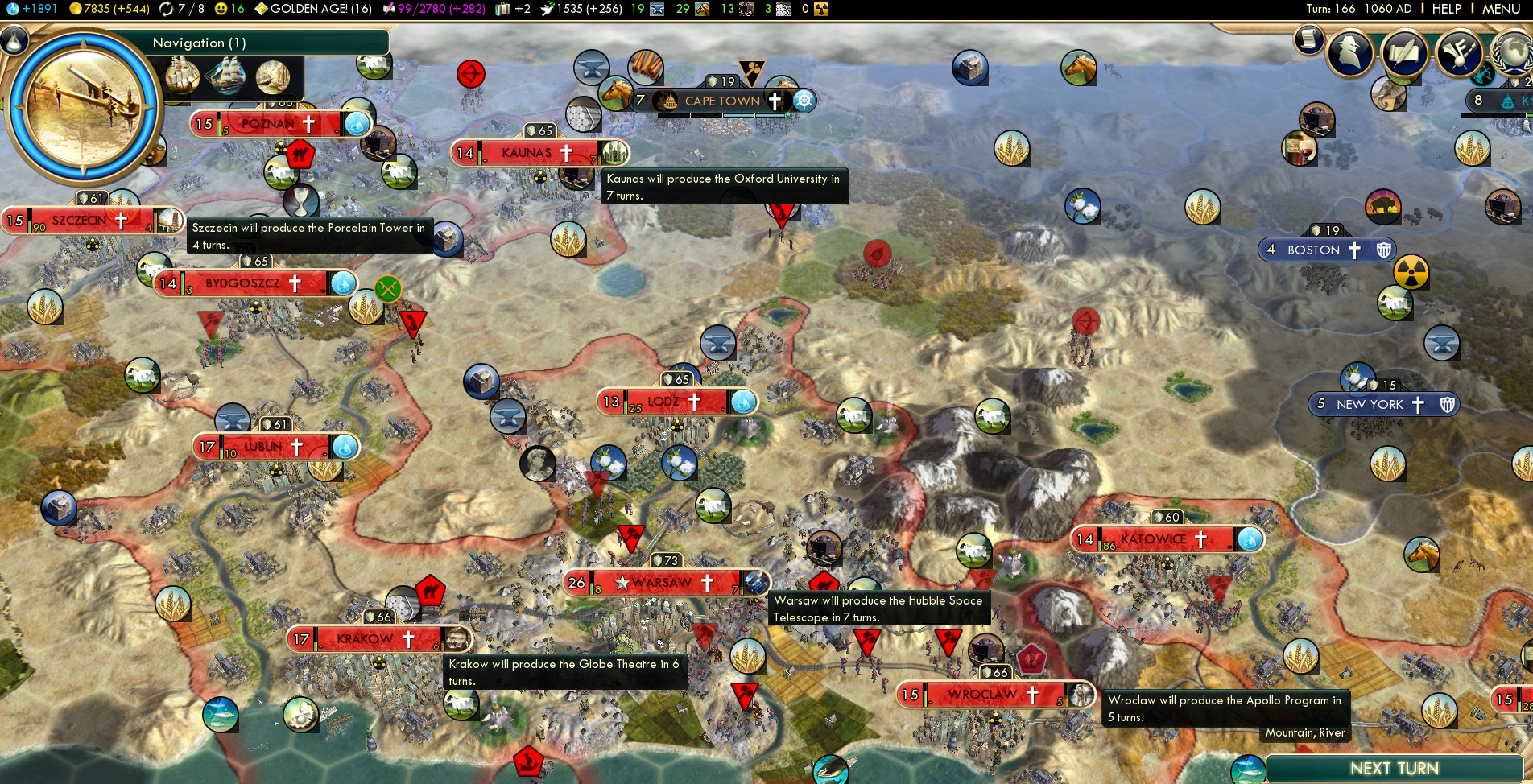
And here we are with all the important endgame stuff set up to be built in parallel. I'd smartly set up Wroclaw with sea production trade routes to get Apollo done at the same time as Hubble in the capital. As usual, the plan was to finish all the regular Great Scientists first and then take the (cost-escalating) freebies from Liberty, Hubble, and Globe Theater.
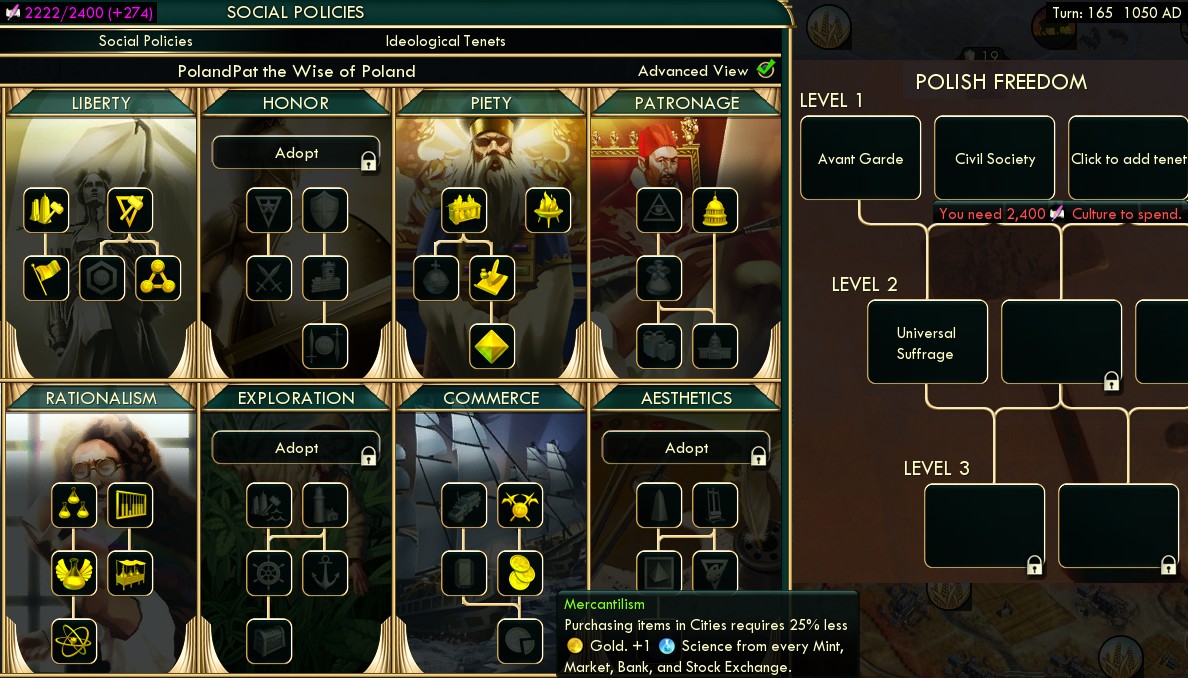
The big challenge going on now was trying to squeeze in one more policy than usual. I was aiming for 17 full-cost policies plus all the freebies. I used to regularly get that number in games that finished around turn 190. But a game that goes fifteen turns shorter will only have time for one fewer policy, but I was trying to cram in that one anyway.
Why was this so urgent? Because that one more policy would be Mercantilism. That policy is such a major part of Poland's endgame strength, where the discount makes the spaceship parts easily affordable, and the science component matters quite a bit too. As always, I was tweaking the sequencing; even though the stretch goal was Mercantilism, I actually claimed that sooner and calculated ahead for exactly enough policies to still finish the ideology.
That's why I built amphitheaters and the one opera house, and made sure to buy all five cultured city-states into alliance. To play this correctly, I had to save all my Great Writers to the very end. Not just for maximum culture value, but to get this sequence correct:
- wait for the last normally-spawned Great Scientist
- only then take the Liberty finisher for that scientist
- the Liberty finisher is Representation
- so that the discount kicks in with the most writers and policies still to come that I can manage.
The timing worked out that I had to take the third level-1 ideology tenet earlier. The last regular scientist spawned on turn 172, so on t173 I spent two Great Writers to get Representation and the Liberty finisher. Then the third regular writer came on t174 and the Globe Theater writer on 175, which together finished the level-2 and level-3 Freedom tenets up to Space Procurements.
Back over to the tech department:
- t166-169 burn the overflow from Rocketry into the top line of cheap techs Navigation, Archaeology, Biology, Refrigeration
- t171 bulb Fission, overflow to Combustion
- t172 bulb Combined Arms with the last regular scientist, overflow to Penicillin
- T173 bulb the Liberty finisher scientist and both faith scientists for Computers, Robotics, Ecology, to get up enough overflow for Adv Ballistics
- T174 bulb the Hubble and Porcelain Tower scientists for Nanotechnology, Telecommunications, Mobile Tactics
- T175 complete Oxford for the last tech of Particle Physics.
Ultimately I ended up with two separate limiting factors. The third Great Writer came on t174 then the Globe Theater one on 175. Also Oxford completed on 175. I could have cut off one turn by getting both of those right, by working more hammers in the Oxford city, and either building the Writers' Guild a turn sooner or remembering to sequence the Globe Theater in a city after the guild city so both of those writers could spawn on the same turn. But that was the only endgame snag and I threaded everything else together as accurately as possible timed from the last scientist spawn on t172.

And so I bought all the spaceship parts on turn 175 and won on t176. Finally cracked my previous record, by three turns.
So Poland is still the king. That endgame Liberty finisher alone makes a substantial difference, that free scientist gains four turns over waiting for one more to normally spawn. Nobody else but Poland can finish Liberty plus Jesuit Education and all of Rationalism and an ideology. And on top of that Poland frontloads with Citizenship, Patronage, later reaches Mercantilism, and along the way tweaks the timing of everything for maximum turn economy. This civ just seems unbeatable. I'm not sure if there's anything left to try after this, but never say never.